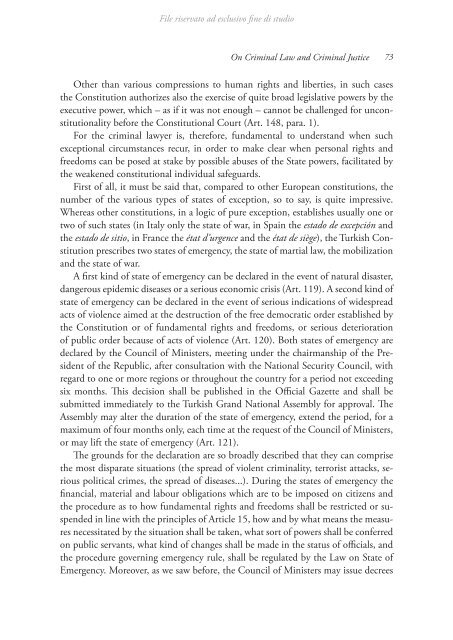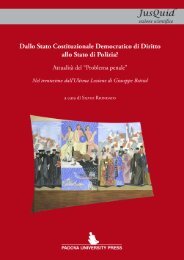il libro - Silvio Riondato
il libro - Silvio Riondato
il libro - Silvio Riondato
You also want an ePaper? Increase the reach of your titles
YUMPU automatically turns print PDFs into web optimized ePapers that Google loves.
F<strong>il</strong>e riservato ad esclusivo ne di studio<br />
On Criminal Law and Criminal Justice<br />
Other than various compressions to human rights and liberties, in such cases<br />
the Constitution authorizes also the exercise of quite broad legislative powers by the<br />
executive power, which – as if it was not enough – cannot be challenged for unconstitutionality<br />
before the Constitutional Court (Art. 148, para. 1).<br />
For the criminal lawyer is, therefore, fundamental to understand when such<br />
exceptional circumstances recur, in order to make clear when personal rights and<br />
freedoms can be posed at stake by possible abuses of the State powers, fac<strong>il</strong>itated by<br />
the weakened constitutional individual safeguards.<br />
First of all, it must be said that, compared to other European constitutions, the<br />
number of the various types of states of exception, so to say, is quite impressive.<br />
Whereas other constitutions, in a logic of pure exception, establishes usually one or<br />
two of such states (in Italy only the state of war, in Spain the estado de excepción and<br />
the estado de sitio, in France the état d’urgence and the état de siège), the Turkish Constitution<br />
prescribes two states of emergency, the state of martial law, the mob<strong>il</strong>ization<br />
and the state of war.<br />
A rst kind of state of emergency can be declared in the event of natural disaster,<br />
dangerous epidemic diseases or a serious economic crisis (Art. 119). A second kind of<br />
state of emergency can be declared in the event of serious indications of widespread<br />
acts of violence aimed at the destruction of the free democratic order established by<br />
the Constitution or of fundamental rights and freedoms, or serious deterioration<br />
of public order because of acts of violence (Art. 120). Both states of emergency are<br />
declared by the Counc<strong>il</strong> of Ministers, meeting under the chairmanship of the President<br />
of the Republic, after consultation with the National Security Counc<strong>il</strong>, with<br />
regard to one or more regions or throughout the country for a period not exceeding<br />
six months. is decision shall be published in the Ocial Gazette and shall be<br />
submitted immediately to the Turkish Grand National Assembly for approval. e<br />
Assembly may alter the duration of the state of emergency, extend the period, for a<br />
maximum of four months only, each time at the request of the Counc<strong>il</strong> of Ministers,<br />
or may lift the state of emergency (Art. 121).<br />
e grounds for the declaration are so broadly described that they can comprise<br />
the most disparate situations (the spread of violent criminality, terrorist attacks, serious<br />
political crimes, the spread of diseases...). During the states of emergency the<br />
nancial, material and labour obligations which are to be imposed on citizens and<br />
the procedure as to how fundamental rights and freedoms shall be restricted or suspended<br />
in line with the principles of Article 15, how and by what means the measures<br />
necessitated by the situation shall be taken, what sort of powers shall be conferred<br />
on public servants, what kind of changes shall be made in the status of ocials, and<br />
the procedure governing emergency rule, shall be regulated by the Law on State of<br />
Emergency. Moreover, as we saw before, the Counc<strong>il</strong> of Ministers may issue decrees<br />
73



